From his first writing credit (1981’s adaptation of “The Postman Always Rings Twice”) through his most recent writer-director gig (the 2013 TV movie “Phil Spector”), David Mamet has given us a new appreciation for the way men talk to each other, outlined the keys to pulling off long cons, and provided insightful looks into controversial historical figures ranging from the Prohibition era to tabloid headline-grabbers.
Since he’s amid the longest stretch of his career without a film credit, it seems like a good time to reflect on his catalog so far.
Here are my rankings of every Mamet movie (w = writer, d = director, p = based on his stage play) with the exception of the 1992 TV movie “The Water Engine,” which he wrote from his own play, and which is nearly impossible to find.
This list also skips “Hannibal” (2001), which credits Mamet as a co-writer even though none of his work made it to the filmed version.
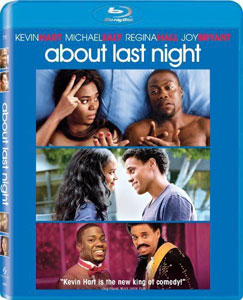
28. “About Last Night” (2014, p)
Calling this a Mamet film is admittedly a stretch. It’s a remake of 1986’s film of the same name, which was itself adapted from Mamet’s play “Sexual Perversity in Chicago.” Some of the 1986 dialog remains, but little or none of Mamet’s words stay, and moving the action to Los Angeles strips away the seasonal time progression. I like Kevin Hart, Joy Bryant and Michael Ealy in other things, but here they are roles, not people. This Steve Pink-directed version could have value as a black twist on what was previously a white story, but there’s nothing race-specific about the two romantic yarns, and the end result is painful at worst, forgettable at best. (Full review.)
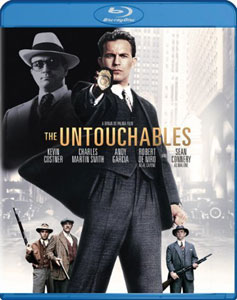
27. “The Untouchables” (1987, w)
I know this ranks much higher on most fans’ lists, but almost everything about this Brian De Palma-directed film rubs me the wrong way. It chronicles feds — led by Kevin Costner’s milquetoast Eliot Ness — who take on booze-runners during Prohibition. Starting with the bizarre decision to put overreaching law enforcement in a heroic light, with no nuance, “The Untouchables’ ” tone-deafness accelerates from there. Sean Connery has too much screen presence to be a beat cop, and Robert De Niro’s scene-stealing Al Capone is underused. De Palma’s leisurely showmanship — that buggy-down-the-stairs scene was a joke even before “Naked Gun 33 1/3 got to it — is a bad match for Mamet’s screenplay. But even so, this is one of Mamet’s weakest efforts. The film does look nice, though, as if it was literally shot during the 1930s. (Full review.)
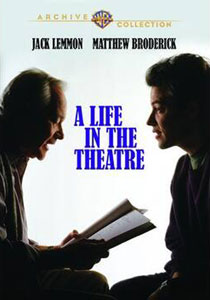
26. “A Life in the Theatre” (1993, w-p)
The pleasure here is watching Jack Lemmon (as the local theater staple) and Matthew Broderick (as the rising young talent) interact, both showing insecurities even though they claim they want constructive feedback. Director Gregory Mosher nicely opens up this TV movie’s scope so it’s not a rote stage adaptation. But the tone is all over the place. Failed theatrical scenes are funny, but Lemmon’s character (who I’m always aware is a step down from his “Glengarry Glen Ross” role) is melancholy throughout. Some theater nostalgia is served up — with rows of seats representing layers of possibility for communicating messages to audiences — but not enough pure love for the medium shines through. (Full review.)
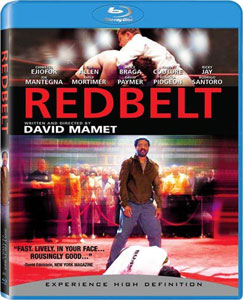
25. “Redbelt” (2008, w-d)
This is the Mamet film that least sticks in my head when I think back on it. It’s about a martial arts instructor (Chiwetel Ejiofor) who has such a strong moral conscience that he tries to find above-board ways out of his problems, even after he’s tricked into getting in deep with criminals. “Redbelt” — which spends too much of its runtime spinning its wheels — strikes me as an experiment wherein Mamet tries to write himself out of a corner, asking if a regular guy can escape an expert con job through sheer will … and MMA-style fighting skills? That mixture remains odd even by the time the credits roll. (Full review.)
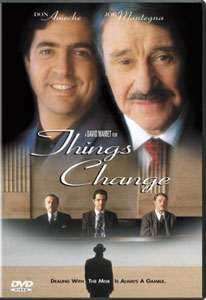
24. “Things Change” (1988, w-d)
Co-writing with children’s author Shel Silverstein, Mamet aims for a Con Job Film With A Heart. Veteran actor Don Ameche plays Geno, a kindly shoe-shiner roped into taking the place of a lookalike mob hitman in exchange for a promised payoff. Young mobster Joe Mantegna is the man’s protector, Jerry, as they await the court trail. It’s sort of like “Dumb and Dumber,” except that Geno is sweet and naive rather than unusually stupid. “Things Change” begs for some hilariously wild hijinks. Instead, we get a schizophrenic mix: Jerry’s stressful situations backed by an incongruously gentle score. (Full review.)
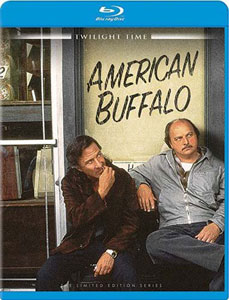
23. “American Buffalo” (1996, w-p)
This film has basically one setting: an evocatively cluttered junk shop run by Dennis Franz’s bitter Don. He spends most of his day shooting the s*** with Dustin Hoffman’s greasy Teach. Teenager Bob (Sean Nelson) adds a third perspective in this dialog-heavy film wherein they debate the value of a rare coin and consider mounting a robbery of a nearby apartment. Beat by beat, director Michael Corrente’s film is enjoyable to watch, and I naturally trusted that Mamet is going somewhere with all of this, but a plot never clicks in. And then it’s over, leaving us to reflect on these people’s sad lives — and the question of whether a plot might’ve made the movie more poignant. (Full review.)
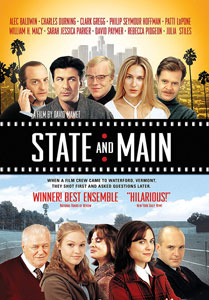
22. “State and Main” (2000, w-d)
I know I rank this lower on my list than most fans, but it strikes me that the actors are too aware that they are in a comedic farce. I like the idea of a movie-industry satire more than the execution, which is too trifling for my taste. For instance, Philip Seymour Hoffman, Sarah Jessica Parker and Rebecca Pidgeon find themselves in one of those “the other woman is hiding in the closet” setups, but it never hits a punchline. Most of the story is telegraphed rather than surprising; the age-inappropriate hookup between a movie star (Alec Baldwin) and a townie (Julia Stiles) can be seen from a mile away. Mamet demonstrates a clear affection for movie-making, but that also blunts “State and Main’s” edge. (Full review.)
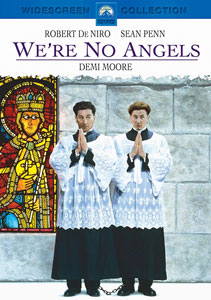
21. “We’re No Angels” (1989, w)
Among Mamet’s capital-C comedies, I slightly prefer this remake of a 1955 film to “State and Main” because it has crazier, more gut-busting moments. The constantly mugging De Niro, so brilliant in other roles, gives a prime example of how bad he can be in comedies, but Sean Penn is excellent as his simple-minded fellow prison escapee, and Demi Moore is good as an amateur con woman. Director Neil Jordan’s film pokes fun at religion in a broad but friendly way, but the real strength is Mamet’s plotting. These likeable escaped convicts desperately do whatever it takes to avoid getting caught — using everything from cats to clothespins to impromptu speeches — and the movie only gets funnier as Mamet keeps the events (barely) in the realm of plausibility. (Full review.)
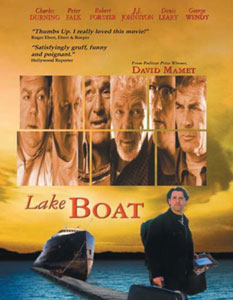
20. “Lakeboat” (2000, w-p)
Mantegna directs a cinematic version of his pal Mamet’s play in the flat style of a first-time helmer, but the material — a bunch of dudes shooting the s*** on a boat on the Great Lakes — is strong enough to overcome it. Mamet’s half-brother Tony is the young audience surrogate experiencing these curmudgeonly seamen for the first time, and the cast is rounded out by an excellent Robert Forster and fellow veterans Peter Falk, J.J. Johnston, Jack Wallace, Charles Durning, Denis Leary and George Wendt. “Lakeboat” is a light time capsule about one of Mamet’s summer jobs that has just a touch of universality. (Full review.)
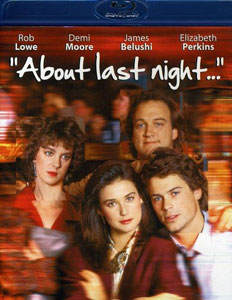
19. “About Last Night …” (1986, p)
Mamet has expressed regret about selling the film rights for “Sexual Perversity,” but this version — unlike the 2014 remake — is not bad. It starts with Jim Belushi’s Bernie telling an amusingly long, ribald story about his sexual exploits to young Rob Lowe. Then it settles into a fairly standard romantic drama as Lowe’s Danny and Moore’s Debbie take a crack at living together. Bob Seger and John Waite needle drops enhance the era, and director Edward Zwick smartly uses Chicago’s change of seasons to parallel relationship phases. It ends up being more of a Zwick film than a Mamet film, but hey, I’m a fan of Zwick too. (Full review.)

18. “The Edge” (1997, w)
The best part of “The Edge” is the work done with the stunt grizzly bear that hounds Baldwin’s Bob and Anthony Hopkins’ Charles, who are lost in the Alaska woods after a plane crash. Director Lee Tamahori’s film is one of the last to use live-action animal stunts rather than relying on CGI. Ironically, the survival thread is so good that the Mametian rivalry between Bob and Charles is subsumed. Granted, there are some clues to reflect on, including the question of whether one of them is luring the bear on purpose. But overall it doesn’t ring true that their jealousies outweigh the bond that should’ve developed in a desperate survival situation. (Full review.)
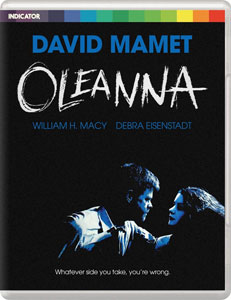
17. “Oleanna” (1994, w-d-p)
Loathed by some viewers because of the first-time performance by Debra Eisenstadt and the sparse setting of a professor’s office, “Oleanna” is difficult to watch even for apologists like me. But it’s supposed to be, as we are right there with John (William H. Macy) as his attempt to give honest guidance to Carol gradually turns into a nightmare: She accuses him of sexual harassment, and it could cost him his reputation and livelihood. “Oleanna” is often referenced as a study of the rise in sexual harassment claims in recent decades, and it’s controversial in some circles because it shows the man being victimized by a false claim. But it’s underappreciated as a commentary on the dangers of people who can’t think for themselves being told how to think. (Full review.)

16. “Homicide” (1991, w-d)
Be forewarned (and I should’ve heeded this warning myself): “Homicide” is not a juicy murder mystery, even though there is a murder and it is set in evocatively violent Baltimore, also the setting of the unrelated TV series “Homicide: Life on the Street.” Instead, Mamet is interested in the police detectives who work the murder case, and the socio-politics of being a cop and being Jewish — a balance Mantegna’s self-loathing Bobby never becomes comfortable with. “Homicide” closes with wonderfully bleak underground tunnels, a deliciously villainous turn by Ving Rhames, and harrowing death scenes. It’s not a pavement-pounder, and I suspect non-Jewish, non-cop viewers won’t totally get Mamet’s message. Ultimately, I admire “Homicide” more than I like it. (Full review.)
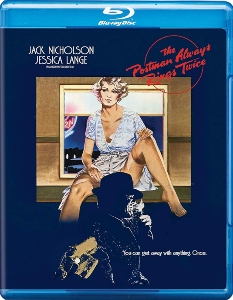
15. “The Postman Always Rings Twice” (1981, w)
Mamet is more interested in the schemes and director Bob Rafelson is more interested in the steamy scenes between Jack Nicholson and Jessica Lange. But that uneasy marriage is kind of appropriate, because Frank and Cora themselves have an uneasy marriage. While we don’t necessarily root for these people as they plot a murder and cover-up, we do sympathize with them, and it’s fascinating to see them drag each other along; either one, left to their own devices, would not go through with it. The 1930s California setting is gorgeous, providing somewhat of a “Chinatown”-style noir feel, although this is much more of a morality play than a mystery. (Full review.)
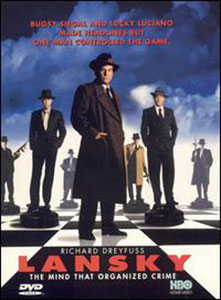
14. “Lansky” (1999, w)
While not as good as “Hoffa,” Mamet’s “other” biography of a mob-connected man is still pretty darn good. I think it does a better job than “Homicide” of illustrating how being Jewish can weigh on a person, in this case the title character played by Richard Dreyfuss and a few other actors portraying Meyer Lansky in his younger years. Biopics of notorious figures are always difficult because they can seem like they are apologizing for the person. Indeed, Lansky at one point greases the wheels for his son’s admission to college, a practice that Mamet has said he sympathizes with. On the other hand, Mamet and director John McNaughton show Lansky commit a murder as a youth. In the end, we get a picture of this complex man and can reach our own conclusions about the gambling industry, organized crime, and the lifetime psychological cost of moving in these circles. (Full review.)

13. “Phil Spector” (2013, w-d)
Another solid TV biopic, this one is especially controversial because music-producing legend Phil Spector is a weird individual (as communicated by Al Pacino’s performance) and he therefore has the Weird Man’s Burden of being held to a different standard. Plus, it has the discomfiting factor of suggesting a flaw in the victim to argue that the defendant is not guilty. Nonetheless, Mamet makes a strong, straightforward case through the procedural aspect of his teleplay that Spector is likely innocent of the murder he went to prison for. “Spector” outlines the specific reasons why a wrongful conviction can happen, including the fact that lawyers aren’t allowed to show theory-based demonstrations in California courts, and the reality that defendants are often tried on their character rather than facts. (Full review.)
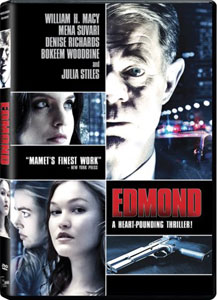
12. “Edmond” (2005, w-p)
Macy gives a bravura performance in this engrossing journey through a night in the worst parts of the Big Apple that descends into dream/nightmare logic without leaving me in the dust — although I can see how it might lose some viewers. Edmond hates his job and is bored with his wife (Pidgeon), so he quits both in order to go on this one-night walkabout. Stiles, Mena Suvari, Denise Richards and Bai Ling have memorable guest turns — all as sexual objects — and one wonders if this rare Mamet film with a substantial female cast is saying something about men’s less savory views of women in their darker moments. Directed by Stuart Gordon, “Edmond” might be Mamet’s most open-to-interpretation film, but that’s not such a bad thing. (Full review.)
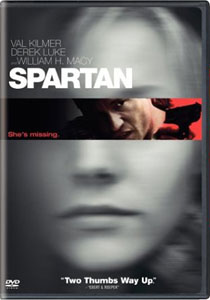
11. “Spartan” (2004, w-d)
An unusually free-wheeling Mamet screenplay and one of the last great turns by Val Kilmer before his career slump conspire to make “Spartan” a sneaky-good gem. Intrigue comes from all angles amid a globe-spanning search for the kidnapped daughter of a Congressman, but it ultimately boils down to a character piece for Kilmer as special agent Scott. He uses weird tactics and there are plenty of clues that he can’t be trusted — but maybe he can be. Ed O’Neill and Derek Luke (who should’ve had a bigger career) also stand out. And Kristen Bell, right before she struck it big with “Veronica Mars,” is outstanding in a brief role as the kidnap victim who feels unloved. (Full review.)
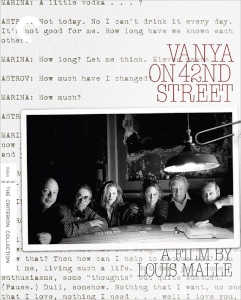
10. “Vanya on 42nd Street” (1994, w-p)
Most fans won’t have this oddity so high on their list (if they list it at all, since Mamet’s contribution is minimal; the film is a straight-up performance of his theatrical translation/adaptation of Anton Chekhov’s “Uncle Vanya”). But I find this to be a beautiful film under the direction of Louis Malle, who gives an unadorned stage in a nearly condemned theater house the feel of lavishness via color and framing. On the whole, “Vanya” is an exercise in open trickery, letting a home viewer feel like they are watching a rehearsal by dedicated actors, but in fact everyone is doing top-shelf film-style acting, complete with close-ups. It’s no surprise that the acting is good, as “Vanya” features stars like Julianne Moore, character-actor legends like Wallace Shawn, and unheralded talent such as Larry Pine and Brooke Smith. (Full review.)
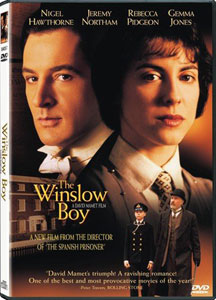
9. “The Winslow Boy” (1999, w-d)
Here is another Mamet adaptation of a play — Terence Rattigan’s 1946 telling of a British boy who is wrongly accused of stealing money from a school locker — but one that’s less artsy. Granted, it is a period piece set at the turn of the 20th century, and it features an of-the-time understated romance between Pidgeon and Jeremy Northam. Impeccably and carefully crafted, “The Winslow Boy’s” biggest strength may nonetheless be its very existence. It brings to light the historical turning point for a British law wherein the Crown couldn’t legally be found to have made a mistake. We see the terrible toll on everyone who works to find justice for the boy, while at the same time never doubting that this is the only possible course of action for people with a strong sense of right and wrong. (Full review.)
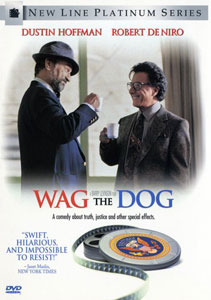
8. “Wag the Dog” (1997, w)
I don’t usually go for political comedies, but this movie makes its statement in such increasingly nutso fashion that I can’t help but love it. Spurred by De Niro’s political fixer, Hollywood filmmaker Stanley (Hoffman) creates a fictional war to divert the public’s attention from a presidential scandal. Director Barry Levinson’s comedy also makes fun of moviemaking to an even bigger degree than the relatively tame “State and Main,” particularly when Stanley directs a scene wherein an “Albanian refugee” (Kirsten Dunst) holds a bag of chips that will be replaced by a CGI cat in post-production. And “Wag the Dog” also makes fun of the public’s gullibility and scolds the press corps for buying into this stuff. The disturbing and relevant undertones are there for the taking, but “Wag the Dog” ultimately shines as a hilarious satire. (Full review.)
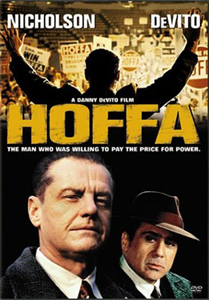
7. “Hoffa” (1992, w)
“The Irishman” is pretty great, but I think director Danny DeVito’s “Hoffa” is a notch better as a biopic of the controversial Teamsters boss. The workers’ union founded by Jimmy Hoffa (a stylized yet outstanding Nicholson) improved the lives of its members, but what backdoor deals did he make to get power for his union? And was he truly interested in improving people’s lives, or was it about personal power? Replete with mid-century period touches, “Hoffa” spends more screen time on the positive aspects of Hoffa and his schemes, but when Mamet and DeVito show the unsavory aspects, they are strikingly unsavory. Mamet also presents a theory behind the man’s disappearance. All told, this makes for a great double feature with “The Irishman,” even though you might be inspired to do further reading after watching both. (Full review.)
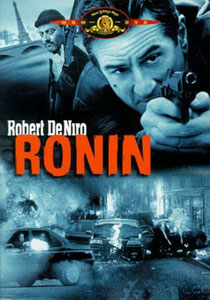
6. “Ronin” (1998, w)
By his own inexplicable choice, Mamet’s name isn’t on this screenplay (he uses the pseudonym Richard Weisz), but dang this is a good movie. For one thing, director John Frankenheimer’s film boasts one of the best extended car-chase sequences that no one ever talks about, as our heroes go crashing through vegetable stands on narrow French streets before taking it to the highways. “Ronin” also features an excellent Mamet con plot — centering on one of those classic deus ex machina cases like in “Pulp Fiction.” It really gets into the weeds, showing us the recon portion of a carefully crafted scheme; this is great stuff if you’re on a Mamet con-movie kick, although you probably don’t want to start here. All of this pairs nicely with an exploration of De Niro’s titular Sam, someone who takes jobs purely for the money but who might not be as inhuman as he pretends. (Full review.)
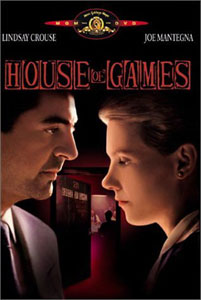
5. “House of Games” (1987, w-d)
Mamet’s directorial debut still stands as the purest example of the con-artist genre. It’s appealingly old-fashioned in its staginess, and driven by a charming Mantegna as con man Mike and a masterfully subtle Lindsay Crouse as author Maggie. We’re right there with Maggie is she becomes fascinated by the details of Mike’s illegal profession and is at risk of falling prey herself. While the functional details of a con — starting with a card game featuring sleight-of-hand artist Ricky Jay — are fascinating, the big revelation is that con men play on people’s natural behavior, assumptions and desire to trust strangers. If you’re thinking of getting into Mamet’s catalog or con films in general, start with “House of Games.” (Full review.)
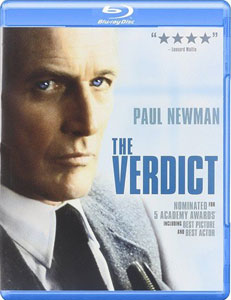
4. “The Verdict” (1982, w)
A courtroom drama at its finest, director Sidney Lumet’s “The Verdict” finds Mamet relishing the intricacies of a medical malpractice case as he adapts the novel by Barry Reed. Paul Newman’s weary Frank Galvin is like a hardboiled version of a lawyer, pounding the pavement to gather information, initially driven by a need to salvage his career. Gradually, as Mametian twists enter the plot and turncoats are revealed, an additional impetus emerges: Frank’s need to win this case, because the plaintiff is getting seriously screwed over by those who hold the power. Like a grander “Winslow Boy,” “The Verdict” is a slow-burn but ultimately pulse-pounding procedural that shows how exhausting — yet also satisfying — it can be to fight for what’s right. (Full review.)
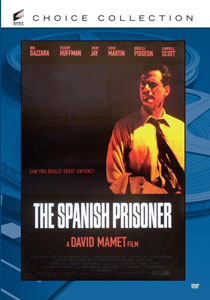
3. “The Spanish Prisoner” (1997, w-d)
“House of Games” might be the purest con film, but “The Spanish Prisoner” is even more intricate. Starring Campbell Scott as Everyman Joe, whose top-secret science formula is stolen, this is a masterfully crafted mystery that has the unusual trait of not being overly head-scratching. The scene-by-scene details are impeccable as we meet people like Pidgeon and Steve Martin, who could be allies or enemies. As Joe gets further into the weeds, he starts thinking about every action, including how loud to talk about something in case a certain person overhears it. The final act allows us to shift our perceptions, thinking about what Joe knows, what the villains know, and what we know as viewers. As the credits rolled, I was thinking about how elaborate a real-world con could be without collapsing, and came to the disturbing realization that — if it’s good enough — we’ll never know. (Full review.)
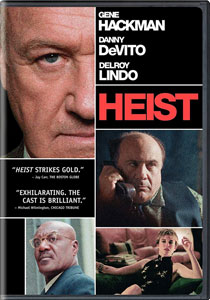
2. “Heist” (2001, w-d)
I’ve listed a few great con-artist flicks so far, and “Heist” is another, but it’s also a prime example of another Mamet trademark: quotable dialog. Gene Hackman and Delroy Lindo are among the veteran heist-pullers who value money above all else. “Gold makes the world go ’round,” Hackman’s Joe explains. Not love? Well, “Love of gold.” Or as DeVito’s villain Bergman’s explains it: “Everybody needs money. That’s why they call it money.” And those lines are nothing next to Bergman’s “last words.” Additionally, “Heist” pulls off the trick of making criminals rather lovable, as Joe and Lindo’s Bobby are longtime friends, and we want them to pull off this one last job and retire comfortably. For all its violence and cynicism, “Heist” left me in a good mood at the end. (Full review.)
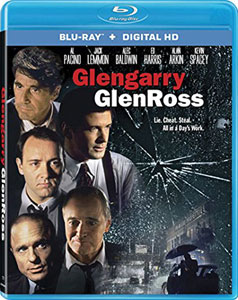
1. “Glengarry Glen Ross” (1992, w-p)
This is Mamet Perfected, as he uses the shady world of unscrupulous real-estate agents (of the “Hey, lemme let you in on this amazing tract of land in Florida” variety) as a platform for brutally cynical and darkly humorous views about white-collar sales work. As with “Heist,” director James Foley’s “Glengarry” is immensely quotable, starting with the boss (Baldwin) outlining the rules of the in-house selling contest: First place is a new car, second place is a set of steak knives (and he actually holds up the package of cutlery), third place is you’re fired. Everyone in the testosterone-laden cast brings their A-game. Ed Harris and Alan Arkin get a classic flurry of Mamet-speak as they bat around the idea of stealing company property with neither of them coming out and saying it, and Pacino (in his vintage mode of raising his voice to cap sentences) gets a deliciously curse-laden monologue as he rips into middle manager Kevin Spacey for a screw-up. The highlight, though, is Lemmon as Shelley “The Machine” Levene, a past-his-prime salesman who has become pathetic and understandably vindictive. It’s a legitimately archetypal role, as “The Simpsons” would go on to craft sad sack Gil Gunderson from Lemmon’s performance. (Full review.)
How would you rank the films of David Mamet’s catalog? Share your lists in the comment threads below.


